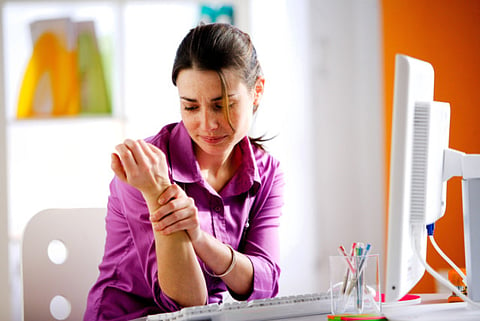Arthritis in UAE: Diagnose disease early
20 per cent of population affected by disease

A large section of the UAE population suffers from Rheumatoid Arthritis, a disease that swells up the joints and causes pain, but there was a huge delay in diagnosis of the disease. Reason? The affliction has varying symptoms, including fatique which could deflect attention to other illnesses.
“People were going to the wrong doctor believing the symptoms to be some other problem. Others thought they were just feeling tired, or getting old,” says Katrina Thornely, patient support director at the Emirates Arthritis Foundation, who incidentally suffers from rheumatoid arthritis herself.
The Foundation was set up in 2006 to make people aware of the affliction and today, the delay in diagnosis has been brought down to 7 months from 24 months.
Rheumatoid Arthritis is an auto-immune disease, which means that your own body cells attack areas such as the joints. “It takes a trigger such as stress, to set it off,” says Thornely, who is undergoing a new type of therapy.
One key factor for the delay in diagnosis is because there are not enough trained rheumatologists practicing in the UAE, according to Dr Humeira Badsha, Specialist Rheumatologist. She had earlier pointed out that WHO (World Health Organisation) recommends 1 rheumatologist for every 100,000 members of the population. “In the UAE, there is a definite shortage of trained rheumatologists,” she says.
Arthritis affects 20 percent of the UAE population but only 6000 people have been officially diagnosed, according to the Foundation, which is a brain-child of Dr Badsha. It warns that Rheumatoid Arthritis can reduce life expectancy by 3 to 18 years. “Within 20 years of diagnosis, 90 percent of sufferers will be disabled,” it says.
The doctor advocates the need to address the issue of delay in diagnosis so that sufferers of the disease can lead a better quality of life. There are, she says, a 100 forms of arthritis and many can be easily treated.
Unfortunately, however, patients in the UAE are unable to find the right specialist for their disease. Dr Badsha had two referrals from doctors in the UK for patients living here in Dubai, who found it easier to find a Rheumatologist in London. “Most of my patients have had three or four opinions for their disease, and are finding no solutions,” she says.
According to the Foundation, there are seven common symptoms of Rheumatoid Arthritis and that includes pain in more than one joint, affecting the fingers, wrist, elbows, toes, knees, shoulders and ankles.
The swelling of joints may also occur and makes the joints feel like small balloons filled with water.
“Several steps can be urgently taken to improve the care of rheumatoid arthritis in the UAE,’ said Dr. Badsha, “including increasing patient awareness of the necessity to seek early specialist opinion and obtain the right treatment.”
Early treatment can prevent joint damage and deformity. With early identification, sufferers can learn the steps to manage the disease through medication, rest, exercise, and a better understanding of how to protect their joints.
The doctor points out that in the last 10 years, there has been a happy increase in the kind of treatments for Rheumatoid Arthritis and diagnosed early and corrcetly, it can help people can lead a normal, productive life.
About 70 percent of people, Dr Badsha says, will respond positively to the initial treatment, but the rest 30 percent will have to undergo treatment with a new class of medications called biological drugs, which are very expensive.
There are 8 such biological drugs that mimic the biology of the body that causes the problem. “These have lesser side effects,” she says.
But the cost is prohibitive, between Dh6,000 to Dh9,000 per month. “It is not for everyone. The patient has to meet certain criteria to be given this medication.
The Emirates Arthritis Foundation is working with insurance companies to formulate guidelines so that patients get the treatment they require. Being an auto-immine disease, Dr Badsha advises people to avoid eating junk food, and foods with artificial colours and preservatives which predisposes you to the disease.
Sign up for the Daily Briefing
Get the latest news and updates straight to your inbox



